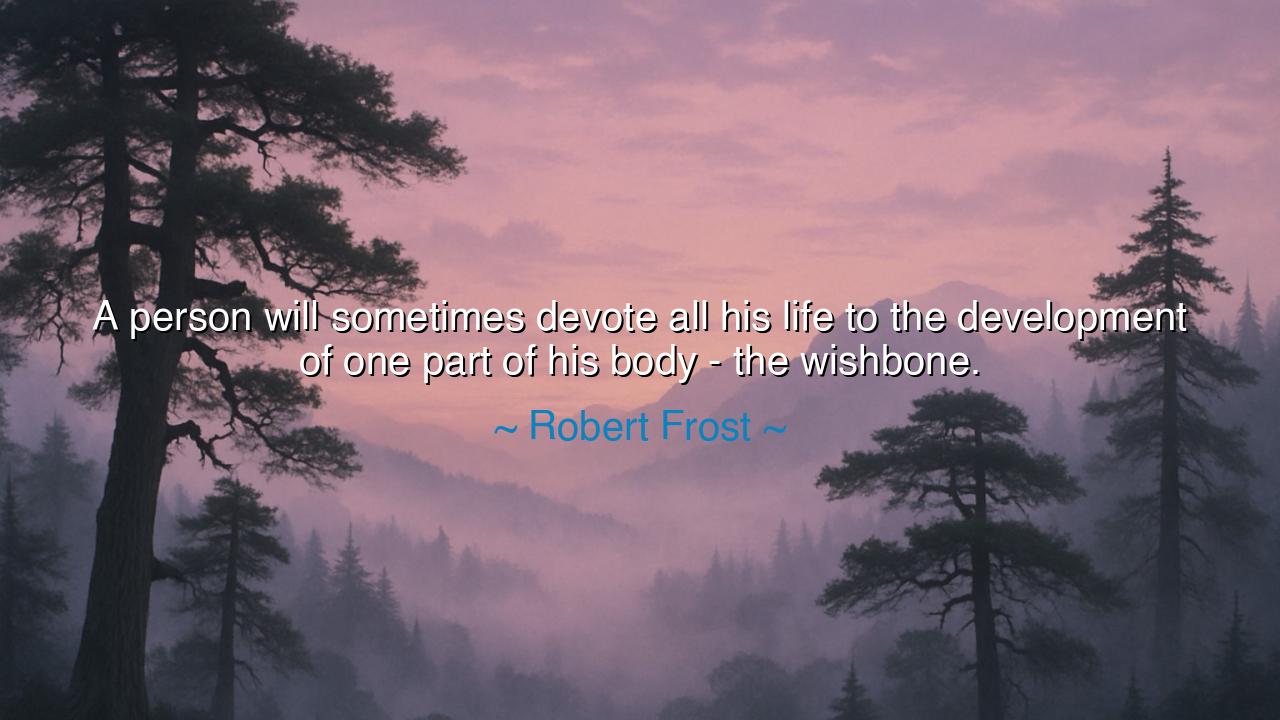
A person will sometimes devote all his life to the development of
A person will sometimes devote all his life to the development of one part of his body - the wishbone.






When Robert Frost, the poet of nature and conscience, declared, “A person will sometimes devote all his life to the development of one part of his body — the wishbone,” he spoke not with scorn, but with a weary tenderness toward humanity’s tendency to dream without daring. His words are sharp as winter air, yet behind them lies compassion for those who live forever wishing but never doing. The wishbone, that fragile bone of hope and superstition, becomes in his hands a symbol of a life spent in longing — a life where desire replaces effort, and hope becomes an excuse for inaction.
Frost, who wrote of rugged landscapes and the moral trials of simple men, believed that the worth of life was measured not by what one dreamed, but by what one endured and achieved. He lived through hardship — through poverty, loss, and rejection — yet he built his name through perseverance. He knew that the world rewards not the dreamer who waits for fortune to smile, but the laborer who rises each morning to carve his fate from stone. Thus, in this quote, Frost delivers his quiet rebuke to those who live only in the realm of desire. To “develop the wishbone” is to strengthen the habit of wanting without acting — to grow expert in wishing while neglecting the bones of work, courage, and persistence.
To understand this wisdom more deeply, one must see how it applies to the human heart. The wishbone is an ancient symbol — children pull it apart and make a wish, believing that fortune favors the one who holds the larger piece. But life, Frost reminds us, does not yield to such charms. A man may wish for greatness, for love, for peace, but unless he joins his will to his hands, his dreams turn to dust. True fulfillment comes when desire is harnessed to action, when the backbone and heart work together to give life to vision. Without that, the wishbone becomes a hollow relic — the monument of what might have been.
History is rich with examples of those who refused to live by the wishbone alone. Consider Thomas Edison, who dreamed, yes, but labored endlessly through ten thousand failed experiments before the light finally shone. His life was not a prayer for luck, but a song of endurance. Or Florence Nightingale, who did not merely wish to ease suffering — she walked into the shadows of war and built hospitals amid the cries of the dying. Their greatness was not given by chance; it was forged by purpose. They are the living refutation of Frost’s lament, the embodiment of those who use not the wishbone, but the will.
Yet how many in our age have fallen into the snare Frost warned of? The wishbone has become our idol — we wish for wealth without effort, fame without sacrifice, change without courage. We speak of dreams, but our hands remain still. We envy the builders, yet refuse the weight of their labor. Frost’s words, though simple, are a mirror for our complacency. He calls us to rise from our wishing and to act — to replace passive longing with creative striving, to trade fantasy for fulfillment.
The lesson, then, is clear and timeless: do not mistake wishing for living. Life begins when we step beyond the threshold of desire and walk the road of discipline. Dreams are sacred, but they are only seeds — they require toil, patience, and courage to bear fruit. To develop only the wishbone is to live half a life, forever hoping for what might come instead of shaping what will be. True strength lies in the backbone, the steadfast spirit that bends but does not break, that works quietly while others dream aloud.
So, my child, if you would live fully, do not worship the wishbone. Dream, yes — but let your dreams find hands. Let your hope be wedded to endurance, and your desire clothed in labor. For the world belongs not to those who wish, but to those who will. As Frost would remind us: hope alone is a feather, but action gives it wings. Live, then, not by wishing for the wind, but by sailing against it — and you will find that even the smallest life, lived with purpose, can outshine a thousand empty dreams.






AAdministratorAdministrator
Welcome, honored guests. Please leave a comment, we will respond soon